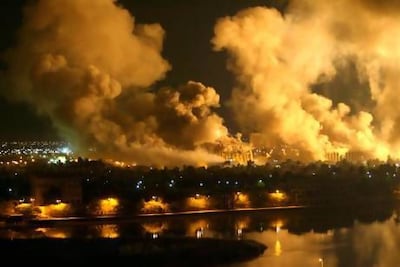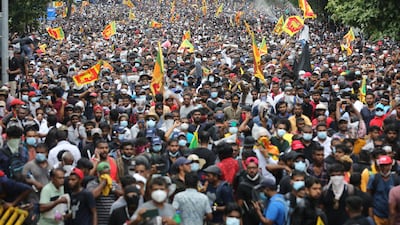There is a clear trust deficit in many parts of the world, as political unrest, conflict and labour disputes spring up with more frequency.
According to findings published by the Organisation for Economic Co-operation and Development (OECD), there is a big problem in countries across Europe, Latin America and the Asia Pacific. In the OECD survey, released on Wednesday, of 50,000 people across 22 nations, 41.4 per cent say they trust their national government and 41.1 per cent say they do not.
While the data does not cover the world’s biggest economies, the US and China, it is indicative of a global picture. In Sri Lanka, for example, months of protests culminating in the seizure of government buildings followed a breakdown in faith that existing leadership could resolve the country’s economic crisis and raise standards of living.
Last week, amid efforts to secure a workable majority in parliament, French President Emmanuel Macron described the political landscape in his country as "exceptional". In the UK, where a leadership contest to replace outgoing Prime Minister Boris Johnson is under way, only 35 per cent of people said they have faith in the government.
Brazil’s upcoming presidential race is already mired in a deluge of fake news online about the candidates, that is stoking distrust in the electoral system. Argentina’s farmers have gone on a 24-hour strike to protest against economic policies.
And at the G20 foreign ministers meeting in Bali last weekend, Indonesian Foreign Minister Retno Marsudi urged the group to find ways to co-operate amid the war in Ukraine, and food, energy and climate crises. “Honestly, we cannot deny that it has become more difficult for the world to sit together,” she said. At the same meeting, US Secretary of State Antony Blinken and Chinese Foreign Minister Wang Yi held talks, which it is hoped will “enhance understanding, reduce misunderstandings and misjudgements”.
Trust in economic and financial institutions and systems seems to have gone, too. Workers demand better pay and conditions now, unable to rely on employers’ assurances about the future with the cost of living spiralling. Italian air traffic controllers will strike this weekend. Swedish pilots are already taking industrial action. UK railway workers plan to walk out for a day at the end of the month. There are many more examples.
“Trust is absolutely essential to everything in society working well,” Tonia Reis, director of Edelman’s Trust Barometer surveys, told AP this month. “It’s one of those things that, like air, people don’t think about it until they realise they don’t have it, or they’ve lost it or damaged it. And then it can be too late.”
So, how can we fix this situation?
On Wednesday, OECD Secretary General Mathias Cormann said: “Ultimately, to boost trust, governments need to get better at taking people into their confidence, by better communicating the need for reforms and their impact.” But he is not quite grasping how bad things have become. Trust cannot be won back through speeches and news releases.
The loss of trust can be traced back to at least the 2003 invasion of Iraq. The support for the war in the US and Britain was built on a false argument that Iraq’s dictator Saddam Hussein had weapons of mass destruction he was able to deploy against countries around the world.

When people understood how they had been misled, it was the first major break in the foundation of trust in the world order that had been laid at the end of the Cold War in the early 1990s. Added to this, the response to the financial crisis in 2009 – when central banks and governments pumped trillions of dollars into the financial system – further eroded faith in the entire system. Then there has been the realisation of how Big Tech companies have abused consumers in the past decade, coupled with the rise of fake news.
The erosion of belief has led to the rise of populism and other political consequences as the economic situation of individuals deteriorated. Now many of these populist leaders have also failed to deliver on expectations. It is arguable today that no individual, or party, or institution, is in a position to restore levels of trust on any kind of scale.
This is because, in 2022, people are increasingly looking to themselves for answers rather than reliance on authority to achieve their goals. Self-reliance is not the same thing as the individualism and free market economics championed by former US president Ronald Reagan and former British prime minister Margaret Thatcher, in the 1980s.
The free market has failed us, too. And the shrinking of government has made it unequal to the challenges of the 21st century. Authorities are also unable to adequately regulate the private sector, which has grown both too powerful and inefficient.
The next era will be one where technology is harnessed to help people remove the institutions that they no longer trust from the bulk of their day-to-day lives. It is the empowering of individuals, so that they can enjoy radical levels of choice and control, that will begin to restore the confidence and faith in societies, governments and businesses.


